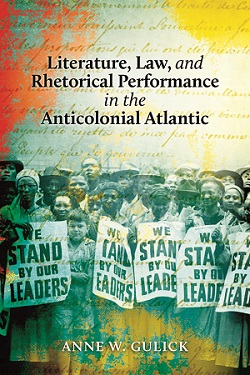Literature, Law, and Rhetorical Performance in the Anticolonial AtlanticAnne W. Gulick |
 3/14/2016 LITERARY CRITICISM / African LITERARY CRITICISM / Caribbean & Latin American LITERARY CRITICISM / General LANGUAGE ARTS & DISCIPLINES / Rhetoric LAW / General 304 pp. 6x9  $99.95 cloth 978-0-8142-1302-5 Add cloth to shopping cart $34.95 paperback 978-0-8142-5213-0 Add paperback to shopping cart $29.95 PDF eBook 978-0-8142-7437-8 Add PDF eBook to shopping cart Shopping Cart Instructions Review/Change Shopping Cart & Check-out | |||
|
“Literature, Law, and Rhetorical Performance in the Anticolonial Atlantic is a highly original and thoughtful contribution to Postcolonial Studies. In thinking through the significance of key juridical-rights documents, Gulick suggests a new history of ‘postcolonial’ literature as well as a new method of reading that fits with postcolonial theory’s deconstructionist past and points toward a future in which language and politics are more than interrelated. This is the kind of book that literary studies needs, one that claims that language and literature are central to understanding politics and the public, not ancillary or just reflective. It is of interest for those in Postcolonial Studies, Area Studies, Caribbean Studies, African Studies, Diaspora Studies, Political Theory, Human Rights Studies, and World Literature.”—Samantha Pinto, Georgetown University “Literature, Law, and Rhetorical Performance in the Anticolonial Atlantic is an excellent contribution to a new wave of postcolonial analysis that is not bound by issues of genre, geography, or canonicity.”—Michael Malouf, author of Transatlantic Solitaries: Irish Nationalism and Caribbean Poetics The era of national liberation and decolonization may have come and gone, but postcolonialism remains a largely elusive ideal in the early twenty-first century. In Literature, Law, and Rhetorical Performance in the Anticolonial Atlantic, Anne W. Gulick uncovers a dynamic literary history of African and Caribbean critical engagements with First World law. This transatlantic archive attests to the continuing vitality of anticolonialism as a model for intellectual inquiry and political performance. Gulick argues that experimentation with declarative forms is a vital rhetorical strategy in the anticolonial Atlantic—one through which writers have asked: Who gets to “write” the law, and under what circumstances? Responses to this question take shape across the black Atlantic from Haiti to South Africa, in texts ranging from Haiti’s Declaration of Independence and work by C. L. R. James to South Africa’s Freedom Charter, Aimé Césaire’s poem Notebook of a Return to the Native Land, and Ngűgĩ wa Thiong'o’s A Grain of Wheat. These texts constitute a robust transatlantic tradition of challenging colonial and imperial authority through rhetorical performance. Drawing on the cosmopolitan aspirations and emancipatory energies of the political declaration, this tradition aims to radically reinvent the possibilities for law and political belonging in the postcolonial future. Anne W. Gulick is Associate Professor of English at the University of South Carolina. | ||||

